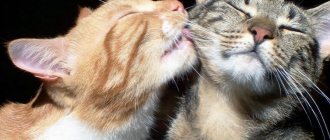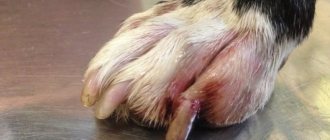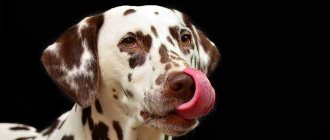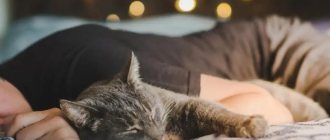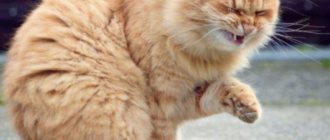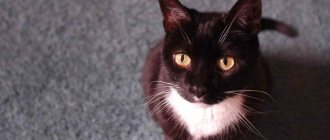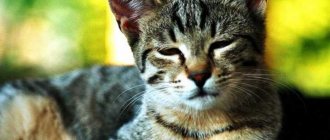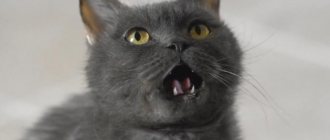Often, owners observe that the cat is constantly licking itself. You should not immediately worry, as this does not always signal health problems. Representatives of the cat family are considered one of the cleanest animals, so the cat licks its fur several times a day. But sometimes frequent licking under the tail and in other parts is the first sign of nervous tension, helminthic infestation and other disorders. If your pet exhibits additional alarming symptoms, then you should not delay going to the veterinarian to find out the source of the constant licking.
Necessary actions of the owner
In case of excessive drooling in cats, a constantly protruding tongue, or other unnatural behavior, you should immediately contact a veterinarian. He will order certain tests or examine your sick pet to make a diagnosis. And only after this it will be possible to begin treatment.
If a foreign body is found in your pet's throat, the veterinarian must remove it. This can be determined after the doctor sees and examines the x-ray. And only then, having removed a bone or even a toy, the doctor treats the oral cavity with a disinfectant so as not to introduce an infection into the wound.
When your cat starts drooling, you should immediately contact your veterinarian. But sometimes, in order to prevent such situations, it is necessary to prevent such diseases, especially excessive drooling. And in the future you won’t have to worry about your pet’s health.
- Regularly clean the animal's mouth (teeth, tongue).
- Flea drops should be applied to the fur in places where the cat cannot lick them off.
- Carry out deworming at the required time.
- Regular medical examinations to avoid serious illness.
How you can help your pet
The dog constantly licks and swallows
A number of causes of excessive licking can be addressed on your own, but some can only be resolved with medical intervention.
So the pet owner will be able to cope with moral discomfort, claustrophobia, stress and nervousness on his own. It is enough to pay attention to the cat every day, to satisfy its hunting instinct (for example, with the same games with a string). When your pet has its own bed or platform, you can place it at a certain height.
For reference: cats love to occupy high places, which makes them feel safer.
If the symptoms are associated with a change of place of residence, it is important to provide the animal with a secluded place, hiding in which it can adapt to new conditions. If your cat has a competitor, it is important not to forget to pay attention to the animal.
An example of how an animal can foam at the mouth
Poisoning can be prevented by regular sanitization of the premises where the cat is. If poisons are used against insects or rodents, it is important to protect the animal from places where the poison is scattered.
To ensure that cats do not have digestive problems, have a strong immune system and healthy teeth, it is important that the pet receives all the important micro- and macroelements necessary for full development. To prevent kidney disease, it is advisable to eliminate drafts in the house.
Additional information: although excessive licking is quite common, many cats cope with the symptoms on their own, so visits to veterinary clinics mainly occur with serious symptoms that threaten the animal’s life.
Reasons why a cat often licks its lips
Frequent licking in cats occurs due to copious saliva production and the need to swallow. This process is not a separate disease. Sometimes pet owners like that their pet licks itself frequently. However, frequent and large salivation may indicate abnormal health conditions.
Reflexes
Licking is a reflexive process inherent in cats by nature, regardless of breed or lifestyle.
Animals run their tongues over their noses for various reasons:
- depending on the type of food - until it is served or the animal perceives an appetizing aroma;
- during sleep, during which the nose dries out and becomes warm;
- desire to drink water - during hot weather, when feeding dry food. The pet should always have access to fresh, clean water in large quantities;
- stressful situation - in this way the pet calms itself, and also washes away unpleasant odors from its fur.
A cat may lick its lips when it sees food or wants to drink.
Nervous tension
Overexcitement, a situation of danger, the washing process, the period of estrus, negative or positive emotions are the causes of nervous tension and stress in a pet. By licking they bring their mental state back to normal.
Nausea
There is a theory that the bactericidal and lubricating properties of saliva help eliminate the urge to vomit, making it easier for processed foods to move down the larynx during vomiting to prevent cutting off oxygen to the lungs.
Claustrophobia
Claustrophobia is the fear of enclosed spaces. As much as cats love boxes, houses and other containers, they are afraid of closed spaces. When a pet does not see an open exit from a room or other room, it experiences severe stress.
In the process of nervous tension, the body works on reflexes, as a result of which hypersalivation occurs, which the animal tries to eliminate by licking.
Overgrooming
The cat performs this action for several reasons:
- Diseases of the skin and its derivatives;
- Frequent exposure to stress;
- Unsanitary conditions in the pet's place of residence.
Frequent licking leads to a change in behavior, as a result of which overgrooming becomes a bad habit. The animal's body begins to produce abundant saliva, as a result of which it constantly licks itself. This behavior of a cat is corrected with great difficulty.
Worms
Infection of a pet with helminthiasis causes itching. By scratching these places, the pet injures itself. As a result, he tries to lick the wounds. For this process, the body increases salivation, as a result of which the cat begins to lick its nose and lick itself frequently.
A cat constantly licks itself - a natural reflex or a harbinger of illness
A cat may swallow frequently when vomiting, and vomiting itself may begin several hours after the start of frequent swallowing movements.
Infections
The cat may constantly swallow, make sounds similar to hiccups, and has a high fever. These signs are classified as infectious diseases of the animal. What kind of disease can only be found out from a veterinarian.
Foreign body
A cat may swallow frequently if its esophagus or stomach is clogged with fur, or if an object has become lodged in it. If your cat is choking on a fish bone or even several fish bones, she may swallow and try to push them down. Sometimes these actions are followed by gagging. If there are hairballs or rain, the cat may vomit them out.
When a needle is swallowed, if it remains in the oral cavity (for example, immersed in the tissues under the tongue), the animal’s body temperature may increase, regional lymph nodes may enlarge, the cat often swallows, and at the site of puncture by the needle (if it breaks and a fragment is stuck in the tissues) it may there may be inflammation and even necrosis.
Kidney pathology
With renal failure, the animal becomes apathetic, drinks a lot, refuses food, and its daily diuresis changes. At the same time, he may often swallow due to severe intoxication and nausea.
Preventing itching
Carry out hygiene procedures as often as possible - wet cleaning, washing cat bowls and washing their bedding.
Regularly clean your pet's ears and treat them with special medications.
Provide your pet with a balanced diet and try to prevent it from coming into contact with other animals.
Now everything has become clear why a cat can lick and itch. To solve the problem with a cat licking, you will have to be patient and time
And it doesn’t matter whether it’s a psychological or physiological reason. By providing your pet with enough attention and proper care, you can count on the fact that after some time his life will return to normal and his coat will be restored.
Symptomatic diet and procedures
Swallowing is often a completely harmless symptom. For example, if a cat is bothered by a lump of fur in its stomach, then it will swallow and lick itself until the lump comes out of it.
To prevent minor problems from developing into serious illnesses, you should carefully monitor what your cat eats, what she plays with, and what foods she may have an allergic reaction to.
It is necessary to remove from the area accessible to the cat all small objects that a curious beauty can taste.
To avoid allergic reactions, you should not prescribe medications yourself, much less treat your animal with medications for humans. All medical procedures must be carried out strictly after consultation with a specialist. By the way, allergies for cats are not as safe as they seem. Animals are also susceptible to attacks of suffocation and swelling of the ENT organs.
Do not forget that compulsive swallowing is one of the very first signs of problems in a cat’s body. Of course, you don’t need to run to the veterinary clinic for the slightest reason, but it is recommended to monitor your pet’s condition for 1-2 days.
Treatment
The veterinarian prescribes treatment not that concerns the itching, but that concerns the very cause of the disease. The course of treatment consists of taking medications and includes both local and internal medications. Depending on the cause of the disease, the veterinarian may prescribe antibiotics, antihistamines (to eliminate allergies), and antifungals.
If scabies and redness of the skin are caused by an allergy to food or hygiene products, their use will have to be stopped and the food replaced with another, in general, to get rid of all allergens.
A little about cat physiology and the reasons for this behavior
These creatures differ from other animals in that they have a highly developed sense of touch. Whiskers, eyebrows, paws are areas that expand the perception of the world. There are many receptors and glands on the pads, the whiskers play the role of an indicator of the emotional state, and vary in shape, depending on the breed.
Cats tend to stomp around in one place, moving their paws as if kneading dough, sometimes releasing their claws, accompanied by purring. This movement is called the “milk step”. These tender expressions of affection apply to humans or other animals as well as to inanimate objects.
Psychological release
Pets experience stress associated with lack of attention, a trip to the veterinarian, a new neighbor and other reasons. Offended or upset cats relieve tension through a release ritual - they trample furniture, extending their claws, or knead a soft blanket or pillow with their paws. During such therapy, the animal releases endorphins, which helps it calm down. If you interfere, it may bite your hand.
Childhood memories
This instinctive movement of the paws in kittens is one of the first, appearing at birth. Babies, nudging into the cat’s belly and massaging it, stimulate milk production. Animals associate feeding time only with positive emotions. They remember how warm and cozy it was next to their mother. Having reached adulthood, feeling full and safe, pets involuntarily reproduce movements from childhood, shifting a blanket or sofa.
Preparation for sleep
Another cat instinct is related to preparing a place to sleep. In their natural environment, animals trample, crushing grass and leaves to prepare a bed. According to some animal psychologists, this instinct has survived to this day, but only in a number of pets. Therefore, the pet tramples the already soft pillow with its front paws before going to bed.
Mating season
The time of mating also forces the darlings to perform this simple action. Estrus is a period of sexual arousal that is extremely difficult to confuse with something else, since the cat begins to actively knead the blanket, arch its back, and move its hind legs, accompanying this with an expressive meow.
After 10-14 days or with the onset of pregnancy, this will pass.
Taking care of the owner
Mustachioed pets show care for a person both through purring and a kind of massage.
Cats feel the approach of a disease, therefore, by sitting on the same part of the body, they try to treat the owner, taking away negative energy. If the cat constantly lies only on his lap, it is better to check if everything is in order with the health of the joints.
Love and devotion
Animal psychologists argue that a high level of trust in a person is another reason for such behavior. So if a pet crushes its owner with its paw pads, it is showing love.
Cats can trample on the body, expressing gratitude for stroking. When the pet, purring, runs through the hair with its paws, it marks the person as its property, trying to protect it from competitors.
Other reasons
The reasons listed are the most common, but it is worth considering less frequent motives for such behavior.
Hunting instinct
Experienced breeders attribute some of the behavior of their pets to ancient instincts. Pets crumple soft things and scratch furniture not in an attempt to annoy them, but in obedience to hunting reflexes.
The wild ancestors of modern cats checked the surface under their paws so that nothing would interfere at the moment of attack, neither too soft soil nor rustling. Cats have not yet forgotten their natural skills, but they do not always use them for their intended purpose.
Territory
According to one theory, this action is a desire to mark territory. There are many glands located on the paw pads. The secret they secrete remains on the surface of the object that the pet crushed. This behavior is more characteristic of cats than cats, and means that the animal is marking its territory.
Diseases of internal organs
Increased salivation may be a sign of some diseases of the animal’s internal organs:
Most pathologies of internal organs in the initial stages of development are asymptomatic.
The first signs appear only as the disease progresses. Accordingly, not every owner will be able to independently determine the disease. Therefore, the diagnosis should be carried out by a veterinarian.
If the animal’s condition is too serious, it cannot be postponed; you must immediately contact the clinic for examination. Timely diagnosis will allow you to quickly get rid of the disease and prevent it from becoming chronic.
Bottom line
Cat drooling is a fairly common occurrence, but usually not life-threatening. Often this problem appears due to the curiosity of animals and the inattention of their owners. Contacting a medical specialist will solve all the issues and cope with the problem of excessive salivation.
The cat owner is required to be attentive and take good care of the pet. During the period of illness, the animal suffers, so it needs not only treatment, but also care and love. This costs nothing to a person, but it helps a lot for a sick pet.
Dangerous complications
Overgrooming is a fairly serious deviation that can lead to negative consequences. Lack of timely and correct assistance can lead to:
- The formation of wool plugs in the stomach and intestines of cats, leading to their obstruction and accumulation of feces.
- The appearance of non-healing wounds, ulcers, scratches, which are open gates for various types of infections. In severe cases, this can lead to the formation of necrotic lesions. To prevent such situations, you need to treat wounds with antiseptic sprays and ointments, cover them with bandages and plasters.
- Disturbances in the natural growth of the coat, as well as deterioration of its protective functions.
Overgrooming is a pathology that requires a special approach, as well as great responsibility. If its cause was physiological health problems, then treatment should be aimed at eliminating them. After recovery from the underlying disease, pathological licking will go away on its own.
In the article I will describe in detail the reasons why a cat licks itself until it becomes bald, and why it licks human skin. I'll tell you what this entails. I will clarify the treatment of overgrooming in cats. I will dwell in detail on why cats lick their owner and whether it is dangerous for humans.
Licking fur is a normal state for a cat. But everything should happen in moderation. If your pet is licking its fur excessively to the point of baldness, you need to think about it. Most often this is a sign of some kind of problem. Let's look at the most common of them.
Stress
Unusual and even inappropriate behavior of a cat is not always a consequence of deteriorating physical health of the animal. Sometimes the reason has an emotional basis.
A number of situations can cause stress in a pet:
- relocation of one of the family members;
- rearrangement of furniture;
- loss of a pet's favorite toy;
- the appearance of another animal in the house and much more.
A cat's life is predictable and orderly, and anything that brings change is not always good for the pet.
Owners often try to impose rules on the cat.
Licking causing increased skin balding is abnormal
But a freedom-loving animal may have its own thoughts on this matter. It is impossible to act impudently here, and you will achieve nothing. It can cause emotional stress. It is better to find contact with the pet, some kind of mutual solution.
Compromise is the only true way out of the situation.
Itching
If your pet feels itchy, it begins to actively lick these places. Moreover, there is a pattern: a cat licks wounds more accurately than itches. If the licking area is large, it means the cat is itching there. Moreover, attentive owners have noticed that when itching, animals most often lick their back, stomach and other parts of the body.
Allergy
Mostly typical for cats. For example, for dry food, which the animal cannot eat in nature, or for its individual components. Sometimes, of course, medications cause side effects. But this happens less often. You can try changing your diet. You need to consult a specialist; you may need to take antihistamines.
Damage to the skin
Animals have no other way to restore health than to do it themselves. And licking wounds is proof of this. The pet instinctively tries to help itself. But if you have already applied the ointment, it is better to exclude this possibility. Apply a bandage or otherwise limit the animal’s access to the wound site. You can wear a special collar.
Movement restrictions
Cats by nature do not like closed doors. They will constantly be tormented by the question of what is happening in the closed area. Imagine that a person was imprisoned in an apartment and forbidden to leave. Over time, he will begin to tear out his hair. Especially if you previously liked to walk outside for a long time. And animals are no exception.
Although a cat can make do with a small space to exist, too little space is also bad. It is recommended to consider the interests of the pet. This is a living creature that also has its own needs.
Causes
The following factors influence the frequency of licking:
- Unbalanced diet.
- Hormonal changes.
- Wounds.
- Urogenital diseases.
- Allergy.
- Stress.
- Ectoparasites.
Licking is a natural process
Unbalanced diet
A domestic cat's coat changes twice a year. This is a natural process that slows down when there is an imbalance of nutrients. Cheap natural food and ready-made economy-class feeds do not have enough amino acids and vitamins for the formation of hairs. Uncontrolled use of food additives only aggravates the problem. Hypervitaminosis is more dangerous to health than a lack of biological catalysts. When using premium food, there are no delays in shedding.
Hormonal changes
A cat is a neat animal, so it eliminates the consequences of hormonal surges. Excessive licking of the genitals is observed during estrus, gestation, and lactation. This phenomenon is temporary; upon transition to a state of rest, the frequency of licking is normalized.
During the aging process, the production of hormones is disrupted, which affects the condition of the coat and skin. The cat is self-medicating.
Licking genitals
Wounds
Damage resulting from injuries, as well as post-operative sutures, itch. Therefore, the animal cleans them by licking. Sometimes protection from cat actions is required. In such a situation, the animal is given a sedative and an Elizabethan collar is placed around its neck.
Urogenital diseases
After giving birth, the female licks her vulva. Often a habit masks the onset of a disease. When endometritis begins, the cat removes scanty vaginal discharge with its tongue, which makes it difficult to notice the inflammation in time. Therefore, the very fact of increased licking should alert the responsible felinologist.
Allergy
Hypersensitivity occurs to certain irritants:
- flea saliva;
- dust, perfumes, detergents;
- accessories;
- feed components.
Allergens cause itching, scratching, baldness, rashes, and blisters that the cat scratches and licks.
Licked himself
Stress
The animal is nervous, trying to calm down, and begins to tidy up its fur coat. It is necessary to pay attention to the accompanying symptoms - marking the territory in the corners, tearing up upholstered furniture with claws, refusing the usual food and begging.
Ectoparasites
Flea bites are very annoying for your cat. Active licking aims to stop pruritis and catch insects. Some animals become allergic to flea bites.
Allow or stop
There are different opinions regarding how to treat pets’ attempts to get closer to their owners in their own “animal” manner:
- Evidence "for". If the animal is healthy, then licking a person's hands is harmless and demonstrates an emotional connection with the owner. By pushing a pet away from oneself or interrupting the manipulation with a rude shout, a person risks offending the pet, who is pouring out his most tender feelings.
- Evidence against. A domestic cat that is not treated for external and internal parasites, as well as stray animals, can be a source of the spread of dangerous diseases and helminths. For prevention purposes, it is necessary to follow the schedule of vaccinations and other sanitary measures when keeping animals.
How to wean it off? Perhaps someone is uncomfortable with a cat's tongue touching bare skin, or the personal hygiene code is too harsh
In these cases, it is recommended to switch the animal’s attention from obsessive kisses to play or treats. Catnip is used as a scent lure and a mild sedative.
Popular wisdom warns against offending cats, which, according to legend, are associated with brownies. According to signs, if Murka licks his right hand, wealth and good luck await the person, and a “marathon” of the face and hair predicts a love date.
Common diseases
The most common diseases in porridge are parasitic. Timely prevention is the best treatment for these diseases. You can find many different anthelmintic drugs in any pet store or veterinary pharmacy. In the end, you should always remember about skin parasites: fleas, ticks, lice eaters. It is enough to simply treat the cat with insecticidal shampoo, as written in the instructions. Another option is to rub an antiparasitic agent into the skin, in the area of the withers, of which there are many in veterinary pharmacies.
Another disease that a cat can get is otitis media (inflammation of the middle ear). This disease brings unbearable pain to your pet. The main cause of this disease is drafts, plus microorganisms such as streptococcus and staphylococcus.
For treatment, it is necessary to take a course of antibiotics. And, also, it is necessary to regularly wash the cat’s ears with hydrogen peroxide (3% solution), then you need to drip 2 drops of iodoform ether inside. And of course, be sure to take painkillers.
Cats are very susceptible to a disease such as purulent conjunctivitis; it is most often caused by pyogenic microorganisms. The main symptom of the disease is the appearance of a characteristic purulent sac on the animal’s eye. When treating this disease, it is imperative to use intramuscular antibiotics. Also, you need to regularly and methodically wash your cat’s eyes with a weak solution of furatsilin, and be sure to apply ointments such as tetracycline, oletethrin, erythromycin to the conjunctival sac every day. If necessary, give sulfonamide drugs orally.
Normal salivary processes
A cat's salivation can be a natural occurrence. This liquid protects the gums, teeth, and oral mucosa from damage. It facilitates chewing food, swallowing processes, has a bactericidal effect and performs other functions. Saliva contains lysozyme, which accelerates tissue regeneration and has an anti-inflammatory effect.
Salivation should not be a concern in the following cases:
- while eating food;
- if the animal smells or sees food;
- while chewing food;
- with severe nervous stress;
- when taking bitter medications (for worms, no-shpa and others).
Salivation increases slightly if the cat is healthy. You can see saliva on the fur near the mouth. If there is a large volume of saliva or its release for more than 10-15 minutes, the owner of the animal should be concerned.
Doctors refer to the process of salivation as “salivation.” Do not be alarmed if your doctor diagnoses ptyalism or hypersalivation. These terms simply mean that the animal is drooling more than usual from its mouth.
What is swallowing?
This is a voluntary process of movement of saliva secreted from the nose or food from the mouth into the pharynx, and then into the esophagus. Swallowing food can be roughly divided into 3 stages (the first 2 of them can be performed consciously, the last only automatically):
- Preparation or oral phase. Food goes through a stage of salivation and chewing. Then it is fed onto the back of the tongue to move into the pharynx.
- Pharyngeal phase. This is the section of the food tract from the oral cavity to the esophagus. Passing through this area, food enters the esophagus.
- Esophageal phase. Food moves down the esophagus towards the stomach and enters the stomach.
Swallowing liquid or saliva occurs according to the same principle: saliva or water accumulates in the oral cavity, moves towards the pharynx, a swallowing movement is made and it enters the esophagus, and then into the stomach.
Natural instincts
Natural factors include:
- I'm going . Cats especially often begin to lick their lips when they see appetizing food. At this moment, an intense release of saliva occurs, which flows outside the oral cavity.
- I'm thirsty . When a cat is thirsty, it swallows saliva more often and licks itself at the same time. The pet must have constant access to clean drinking water.
- Stress . The transferred stressful situations lead to excessive overexcitation of the nervous system. In addition, the cat may actively scratch itself and act anxious.
To determine the cause, you need to evaluate all these factors and try to eliminate the irritating source.
Preventive actions
Fungal and bacterial infections can be prevented by practicing good hygiene. Special medications and treatments will help protect your cat from lichen, dermatitis, otitis media and other diseases. For prevention, you need to regularly treat your pet against fleas, ticks and fungi, and also wash the bowl and tray with disinfectants. Bathing with a special shampoo is beneficial for cats. This procedure only needs to be done once a year.
Important! After treating a kitten with anti-flea or anti-fungal products, the animal should not be bathed. It is forbidden to wet the area where the medicine was applied
The cat licks itself to help itself
Sanitizing the tray and bowl
All items belonging to the cat - bowl, tray, toys, etc. - must be regularly washed and treated with disinfectants. This will protect your pet from infectious, fungal, viral and other diseases. The bowl can be washed with regular dishwashing detergent. Usually fungus does not form on a cat's bowl, most often in the tray. It is advisable to treat it with any antifungal spray against lichen. Additionally, you can treat the tray with camphor alcohol, which not only cleans and disinfects the surface, but also eliminates unpleasant odors.
The bowl and tray should be washed and disinfected regularly
Special flea products
There are many treatments available at pet stores for fleas and other external parasites. They are available in the form of drops on the withers, sprays and collars. It is advisable to treat the cat with drops on the withers; this is the most effective remedy. The room can be sprayed with flea spray. Flea collars are not very effective. It does not destroy insects, but only repels them. A collar can only be put on a cat if it has recently been treated for fleas. Flea drops such as Leopard, Frontline, Advantage, Inspector, and Bolfo spray are very effective.
Flea remedies
Antiseptic treatment against fungus
To protect your cat from ringworm, you need to use antifungal agents. Many of them are used in the treatment of lichen. These products are available in the form of tablets, sprays, shampoos, drops and ointments. One of the most effective remedies for fungus is fungin drops or spray. The medicine destroys many types of fungus. It is better to use fungin in the form of drops so that the cat cannot lick the medicine off itself and become poisoned by it. YAM ointment protects against fungus and mites at the same time. This medicine is very toxic, so you should not allow your cat to lick it off.
Clotrimazole can be taken as tablets orally or as an ointment externally. This remedy effectively treats different types of lichen and destroys fungi and microbes. Sanoderm is an ointment that treats fungal and bacterial infections and inflammations.
Miconazole treats shingles in cats and people. The medicine is produced in the form of tablets, sprays, ointments and gels. It is only suitable for treating adult cats. Stop taking if there is no improvement.
Important! Miconazole should not be used in combination with other antifungal drugs. Fucoricin is a useful antiseptic antifungal agent in the form of a cream or ointment.
With prolonged use it causes allergies and stops working
Fucoricin is a useful antiseptic antifungal agent in the form of a cream or ointment. With prolonged use it causes allergies and stops working.
You can quickly cure ringworm in a cat using Thermikon gel, cream or spray. Broad-spectrum antifungal drugs are very effective - exoderil, imaverol, lamisil. They also have an anti-inflammatory effect.
The kitten should be treated only with anti-fungal products that are specifically designed for children and contain a small dose of a toxic substance. It is necessary to monitor the cat's condition after treatment. At the first signs of poisoning, you should contact a veterinarian.
Antifungal agent
A caring owner will have a healthy and happy cat.
He must understand why cats lick themselves and pay attention in time when the pet needs help. Timely treatment will protect your cat from dangerous diseases.
https://youtube.com/watch?v=mckeaW0gtlw
Why do cats lick themselves?
The reasons why these animals lick themselves all the time are not always as harmless as they seem. Sometimes such licking indicates illness. To understand that it is time to sound the alarm, the owner of such a pet should know why the cat licks itself all the time, paying special attention to certain areas of the body, for example, the area near the anus or nose.
Hygiene, grooming
After contact with other animals and people, cats tidy up their fur. During the washing process, the pet is relaxed and completely focused on the cleanliness of its coat. When washing, he does not focus on one part of the body, paying equal attention to the tail, paws and muzzle. Usually, after the procedure is completed, the animal quietly dozes.
Self-soothing, stress relief
Cats are very vulnerable animals. Any event, be it a change of residence, a trip to the veterinary clinic, family quarrels, the arrival of a new pet in the house or rough treatment, can cause stress in them. Some cats, experiencing strong emotional stress, begin to actively lick their lips. Why do they do this and how does it relate to negative emotions?
Some people, when worried or nervous, bite their nails or bite their lips. Cats lick themselves. So both of them try to protect themselves from an unpleasant situation, transferring the reaction from an inaccessible object or action that they cannot influence to an accessible one.
Trying to get rid of skin parasites
If your pet constantly licks itself and shakes its head, creating the feeling that it is gnawing something out of its fur, most likely it is tormented by skin parasites: fleas, lice eaters, ticks. An animal infected with ectoparasites becomes restless and lethargic, sleeps and eats poorly, and the condition of its coat deteriorates. It is wrong to think that outdoor pests can only affect stray cats or those who are often outdoors. Any pet, no matter how well-groomed it may be, can pick up fleas or ticks simply by rubbing against the owner’s leg after returning from a walk.
Skin itching due to allergies, fungal infections, metabolic disorders
Your pet may constantly lick itself to relieve itchy skin, which is caused by:
- allergic reaction to food, dust, pollen of flowering plants, medications, etc.;
- skin lesions due to fungal infection;
- metabolic disorders.
Allergies do not pose a danger to a cat if treatment is started in a timely manner. Usually it is enough to exclude your pet from contact with the allergen, and the symptoms of an allergic reaction will disappear. A fungal infection can be easily recognized by a number of signs:
- baldness of certain parts of the cat’s body;
- bloody sores covered with scabs;
- dryness, peeling, redness or, on the contrary, pallor of the affected skin.
Itching in the anus due to worms
If your pet is licking under its tail, this may indicate that it has worms. Some types of helminths cause itching in the anus, causing the animal to become restless, sleep poorly and eat poorly. The cat owner needs to examine the contents of the cat's litter box. When a pet is infected with helminthiasis, parasites can be found in its feces. Ignoring the symptoms of this disease can have serious consequences for your cat's health.
Inflammation of the paraanal glands
Why does an animal lick its anus, ride its butt and chew its tail? This behavior may be caused by inflammation of the paraanal glands, which are located on both sides of the anus and serve to produce a special odorous substance necessary for contact with fellow animals. Sometimes these glands become clogged and inflamed, causing significant discomfort to their owner. This usually occurs due to frequent constipation and decreased muscle tone.
Animals over 4 years of age are most susceptible to this disease. The inflammatory process cannot be ignored, as it can lead to blood poisoning, and in especially severe cases, to the death of the cat.
Cats in heat
If your pet has a clear, odorless discharge, she raises her pelvis, throws her tail to the side and actively licks her genitals, it means she is in heat. During the estrous cycle, a cat may compulsively show her genitals to members of the household. If her behavior is ignored, she turns her attention to inanimate objects: a scratching post, corners, doorways.
The cat swallows often
Good afternoon Cat (Turkish Van) 1.3 years old, neutered at 7 months, completely domestic, no contact with the street over the last year, very hyperactive, living in Rostov-on-Don, food - Proplan with salmon for neutered dry, plus 3 times soft a week, raw chicken breast once a week, raw fish several times a month (he hasn’t eaten it for the last 3 months), constantly carries “non-cat” food from the refrigerator. A few days ago his voice changed, it became not so hoarse, but more Hoarse or something, the timbre has changed. two days ago there was an accidental contact on the staircase with a yard cat (she was sneezing, had green snot), he sniffed her and rubbed her (before that he had not seen other cats at all). And now two days later (and since yesterday he has not meows in general) as if he is trying to burp something, tilts his head low to the floor. But not intensely, silently, without drooling or wheezing, gently and once, at intervals of about once every 1-2 hours. It has been noticed that when scratching under the neck, the throat area, this spasm occurs, although not reliably, it practically leads to this. I haven’t pooped for more than a day. When you pick it up under the armpits, it makes a barely audible sound of “discontent,” as if grumbling and slightly extending its claws, i.e. makes it clear that there is discomfort; a wheezing sound is heard when breathing somewhere inside or something. He splashes and licks his lips all the time. And when swallowing, you can hear that it is difficult; a sound is made in the deep throat, as if a person is swallowing with his head thrown back. Prefers to lie near the battery. When palpating the abdomen, there were no pain reactions. I haven’t eaten anything that could get stuck in my throat this week. I had very little appetite yesterday. Today he doesn’t eat at all, sniffs, spits and turns away, doesn’t drink. He sleeps all the time, or sits with his paws tucked towards himself
The eyes are half-closed with the inner eyelid, sleepy. With sudden movements of the hand, he immediately pays attention, the eyes widen, he is interested, ready for a playful “attack,” but that’s where the matter ends
WHEN STROKING AND CAREFULLY IT DOESN'T PURL AT ALL, YET ONE TOUCH WAS ENOUGH!
There is no snot, eye or other discharge, the temperature in the evening of the 28th was 39.4, in the evening of the 29th - 38.7, on the 30th - at 1 am - 39.1. An injection of 0.5 cubes of Gamavit under the skin was given for prevention on the evening of the 29th.
I understand that there can be a huge number of reasons, I am a doctor myself, but at the moment we are in a place where there is no veterinary center, and we will be here for another week. Could he have contracted some kind of nasty disease from a barn cat? Although the timbre of the voice changed the day before contact with her... Is it appropriate to continue Gamavit? (once a day 0.5-0.7) Or is it a respirator? Then tell me some medications or antibiotics? (I tolerated amoxilav normally, I was injected once six months ago, my foot rotted) Then why are there problems with stool, before - every day.
Causes of licking and swallowing saliva
As you know, cats sleep most of the time. The active life of an animal is measured approximately 4-6 hours a day. If 30-40% of this time she is engaged in hygiene procedures, then you can be calm, but if the cat licks itself all the time without stopping, then you need to sound the alarm.
The pet often licks itself for no apparent reason
The reasons may be the following.
Nervousness
One of the most common reasons is nervousness. When you live with a pet for more than one year, you can easily notice when it is stressed or tense. This condition is immediately revealed by the eyes and behavior.
In such situations, the cat often licks itself, because this process contributes to the production of a pleasure hormone. The source of increased nervousness of the animal can be a change of food, a change of place of residence, the appearance of new residents, and even a change of filler in the tray.
Attention! The most common sign of stress is the constant twitching of the tip of the tail.
Reflexes
A cat licks on an instinctive level. That is, it is such a reflex.
To avoid paranoia, it is worth clarifying when it is normal for an animal to lick itself:
- After eating and sleeping, licking yourself is a common thing;
- when food is placed in a bowl;
- when the animal wants to drink (if water is freely available, then this is no longer normal);
- when the house is too hot and the cat’s nose is dry, even while sleeping, licking the dry nose a couple of times is in order.
Often a cat will lick its lips after being petted or cuddled by children. Animals do not like foreign smells on their fur, so they try to eliminate it with this procedure.
Attacks of nausea
If your cat constantly swallows saliva and licks his lips, limiting himself only to his face and not his entire body, this may be a sign of nausea.
An example of what ulcerative wounds in a cat's mouth might look like
In this case, you need to watch the animal. See how the cat eats, whether he eats food at all, whether he drinks enough, look around the apartment for signs of regurgitation of fur.
You should also pay attention to your pet's stool. Attacks of nausea are a common sign of diseases in the gastrointestinal tract, the presence of worms, ingestion of foreign objects, and even vascular diseases.
Kidney pathology
If your cat starts licking itself frequently, there may be something wrong with its kidneys.
It is worth noting that the kidneys are the most vulnerable place of most animals, so this is worth paying attention to first. Disturbance in the functioning of these organs can be identified by related signs: loss of appetite, lethargic appearance, weight loss, frequent trips to the toilet in small quantities, the nose and gums turn pale, there are ulcerative wounds in the mouth, burst capillaries in the eyes.
And others
In general, if a cat begins to constantly lick itself, you will most likely have to contact a veterinarian, because in addition to the above reasons, you can additionally voice:
- Poisoning. A poisoned mouse, low-quality food, chemicals stored in places accessible to the cat - all this can cause poisoning and, as a result, the animal begins to drool, eats little, and experiences weakness and lethargy. Sometimes a kitten can lie for a long time without moving, and additionally suffer from nausea, loose stools and high fever, from which the cat can even shake.
- Dental problems. This pet anxiety is quite difficult to identify. Usually, problems with teeth can occur after the age of 5 and, apart from an unpleasant odor from the mouth, no other symptoms are observed.
- Allergies and internal diseases. Often, allergies in animals are accompanied by itching. Because of this, increased salivation occurs, they sleep little, are active a lot and lick themselves with great enthusiasm in the hope of relieving the itching. It is quite difficult to identify an allergen or the presence of a disease that causes an itchy effect. In most cases, it is worth paying attention to a change in food, place of residence (for example, moving to a country house), and new household items (scratching posts often contain toxic materials).
- Claustrophobia. A very rare occurrence, especially for domestic cats, but such cases have also occurred. A closed space provokes the same nervousness and stress.
- Parasites. A very common reason, especially if your pet’s diet includes raw fish and meat. Signs of parasite infection, in addition to licking, are biting, scratching up to open wounds, the presence of nits, worms, itching in the anal area and, most characteristically, foam in the mouth.
Self-affirmation
This is due to the fact that when communicating in a pack there are senior and junior animals in the hierarchy. A cat that is higher in status can lick another animal. This may mean that she is showing condescension in this way.
This can be understood by the cat's behavior. She shows with all her appearance that in this case licking is in no way tenderness, but just condescension towards you. This manifestation of feelings is more typical for adult pets, those who have gone through puberty. There is nothing dangerous in this display of dominance. The main thing is that the animal does not begin to show excessive aggressiveness on its part.
Maintaining hygiene
A pet needs some regular care. This is especially true for cats that roam freely on the street. The animals themselves also monitor the cleanliness of their bodies, and carry out all cleaning procedures independently. For this reason, cats constantly lick themselves.
Most often, furry pets take care of themselves after eating, sleeping, or visiting the litter box. The tongue of cats is designed in such a way that it is able to clean off matted fur, food debris, dirt, and dead hairs.
In addition to cleansing, licking helps to distribute sebaceous secretions evenly throughout the body. The fat secreted by the animal's skin is necessary to lubricate the coat, which also contributes to its elasticity.
A clean animal carefully licks its fur, washes its face and ears with its paws, and removes unnecessary hair between its claws with its teeth. If your pet has thick fur, it is recommended to inspect it periodically. Sometimes tangles form in hard-to-reach places. For this reason, you should periodically comb the animal with a special brush, and carefully cut off the tangles.
Why do doctors recommend letting indoor cats go outside?
Licking allows you to lay the fur in the right direction - this is another reason why a cat constantly licks itself. In this way, the animals manage to maintain the required temperature regime.
Drooling as a side effect
There are a number of reasons why such a reaction of the body occurs to various changes in what is happening to the pet:
- After a huge shock, the result will be a disorder of the animal’s nervous system.
- Before eating, cats show an increase in salivation.
- During treatment, when the pet is given pills that taste bad.
- When I offer a cat a new food that tastes different from the previous one.
- As a result of excessive contact with children.
- In some animals it is a reaction to the caress of the owner.
We invite you to familiarize yourself with what a Laika dog looks like photo
All of the above reasons cause increased drooling in cats, and this directly affects their health. Therefore, it is necessary to diagnose the disease in a timely manner and immediately begin to treat it.
What symptoms require an urgent trip to the vet?
If you feel stable, you can wait a little longer with the diagnosis. Urgent veterinary care is only necessary when the following symptoms appear:
- loss of motor activity and response to external stimuli;
- increase or decrease in body temperature;
- partial or complete loss of appetite, as well as sudden weight loss;
- deterioration in coat quality (dullness, thinning, baldness);
- the formation of ulcers, rashes, papules and blisters with liquid on the skin;
- severe itching accompanied by active scratching;
- increased thirst or refusal of water;
- frequent vomiting and diarrhea.
With such symptoms, self-help will not only not bring results, but will also cause harm. Instead, the sick pet should be taken to the veterinarian. The reason explaining why the cat often licks itself will be determined after passing all the necessary tests. Based on this, treatment will be selected for the patient.
